Dealing With Stress at Work - Learning to Say 'No'
If you feel that you would like to become better at saying no, then try prompting yourself to think more carefully about the task involved each time that you are requested to take something on. You should also mentally assess what impact not saying 'no' would have on your current commitments.
Your checklist of questions should include the following:
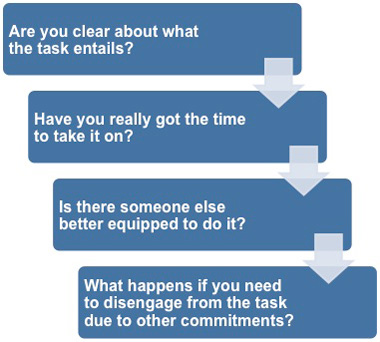 |
If your responses lead you to believe that you'd be unwise to commit yourself to completing the task, then it is in nobody's interest for you to agree to it. Try to clarify your reasons and explain these in a clear and concise way when declining the request.
Be clear about precisely what the task entails
Get into the habit of asking questions before you give any indication of whether or not you will take on any new work. The questions you ask and how you phrase them depends on the kind of person making the request and what kind of relationship you have with them. Some useful questions to ask at this stage are:
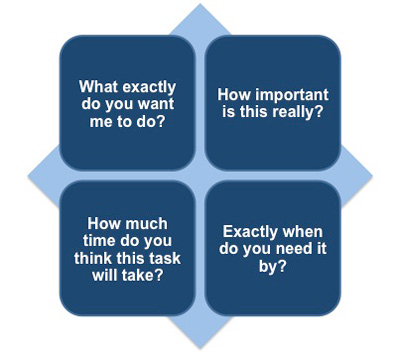 |
Asking a few pertinent questions is a good strategy to follow partly because it makes you look more professional - you want to know what the task is before you agree to take it on - and partly because it trains the other person to think things through, rather than dumping everything on you, with the additional benefit that it also allows you time to think about any implications of the work which may not be immediately obvious.
For maximum benefit, also coach your team to ask these pertinent questions whenever they are approached to take on another's task. This will develop your team members' skills in 'saying no' and ensure you are not interrupted with such requests, unless they feel the implications or repercussions need to be brought to your attention.
Give yourself time to think
If the task is straightforward then, if appropriate, you can agree to commence working on it straightaway. If you have any doubts, however, then the best course of action is to ask for time to check your other commitments and see if it is possible.
By doing this you not only give yourself time to make a considered decision, but also you avoid the possibility of being railroaded into a decision that you'll later regret. Say something like:
'Just give me time to take a good look at my diary and I'll get back to you in ten minutes.'
or whatever phrase is appropriate to the size of the task.
Say 'no' if appropriate
Sometimes the right thing to do is to say 'no.' When you decline a request, the fewer words you use the more powerfully you communicate the message.
Remember, it is natural for people to attack your weakest argument and if you are forced to give way on this, then your whole position is weakened. The best argument is always to say that another piece of work that you are already committed to will suffer if you take on this new task as well.
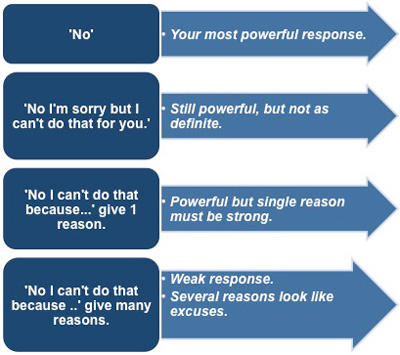 |
If you do say 'yes' then negotiate
You don't usually need to negotiate every time you are given additional work to do but it can have some positive benefits. If there is something you want from whoever is asking you to take on this task, then you are more likely to get it at this time than at any other.
Ideally you want to negotiate for something that's of high value to you but is very easy for the other person to provide.
Another good reason for asking for something in return is that it encourages the person asking to appreciate that you are doing something for them and that there is an associated cost to you.
Here are some of the things that you might ask for when negotiating:
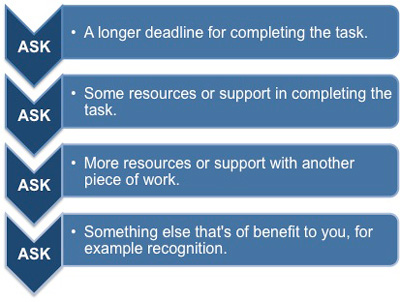 |
Other people and colleagues are much more likely to appreciate the fact that you have agreed to take the job on if you make it clear that you require something in return, than if you just said 'yes' with no conditions attached.
Agree terms
Having done some negotiating and reached an agreement on what you will do and when, it's important to summarize the details of the deal.
Make sure you and the person making the request know exactly what you will be doing, and by when, and exactly what they will be doing in return and by when.
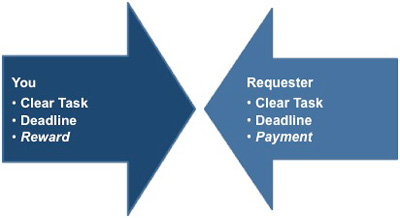 |
With larger or strategic projects it may be appropriate to summarize your agreement in an email.
Our Negotiating Workload Limits eBook provides practical strategies for reducing your workload to a manageable level whilst still being seen as a hard-working and diligent manager.
You may also be interested in:
Dealing With Stress at Work | Examining Your Own Behavior | Negotiating with Your Boss and Colleagues.



